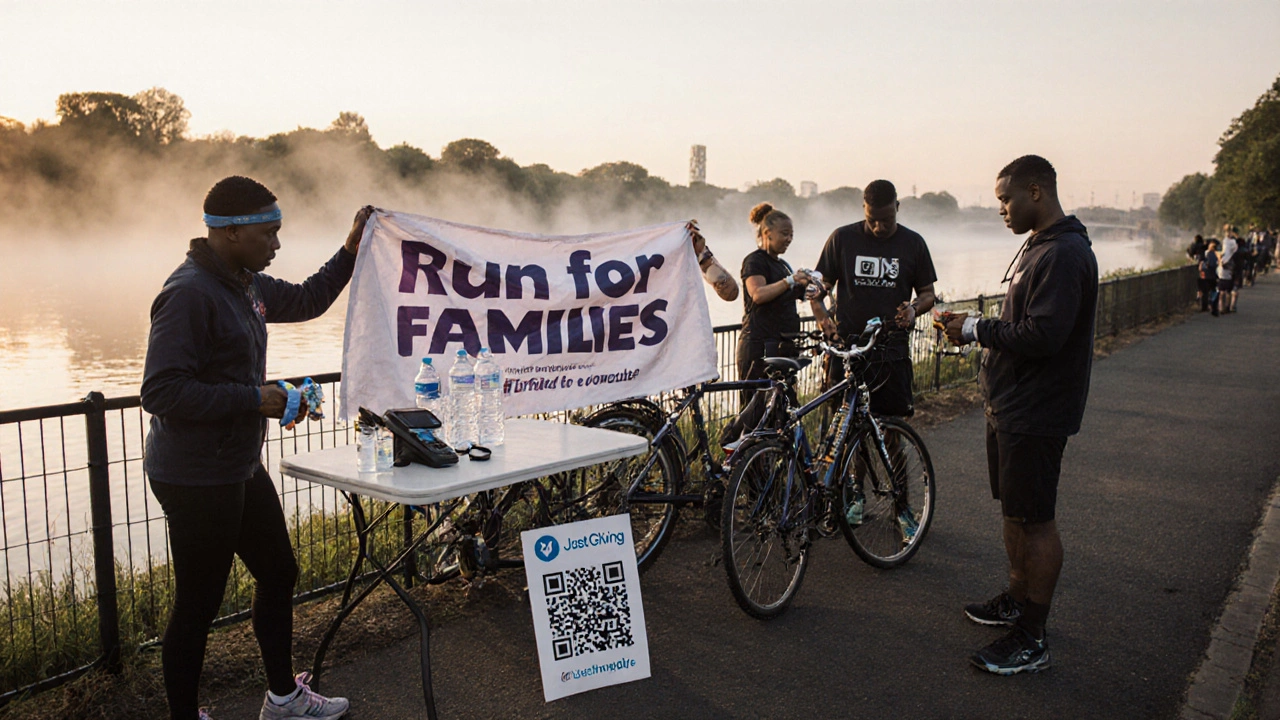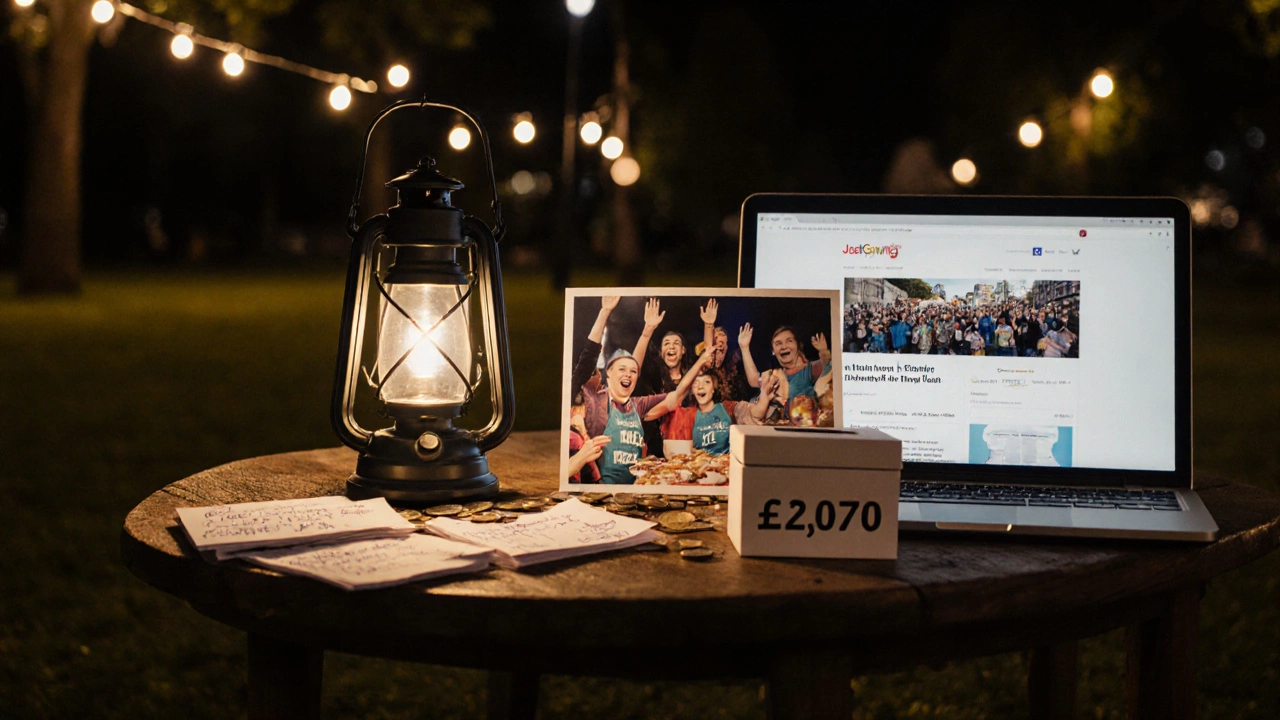Fundraising Budget Calculator
Event Setup
Costs
Donations
Your Results
£0
£0
£0
Starting a fundraising event doesn’t require a big budget or a team of professionals. It just needs a clear goal, a little planning, and people who care. In Bristol, I’ve seen local groups raise over £20,000 in one weekend just by hosting a bake sale and live music night in the park. You don’t need to be an expert-you just need to start.
Define your purpose
Before you book a venue or print flyers, ask yourself: why are you doing this? Is it for a local food bank? A child’s medical treatment? A shelter for stray animals? The clearer your purpose, the easier it will be to get people to care.People don’t give money to vague causes. They give because they understand the impact. Instead of saying, “We’re raising money for charity,” say, “We’re raising £5,000 to provide 1,000 hot meals for homeless families in Bristol this winter.” Specific numbers and real stories make people feel like their contribution matters.
Write your goal down. Keep it simple. One sentence. Then post it where you can see it every day. That sentence will guide every decision you make-from the type of event to the wording on your social media posts.
Choose the right type of event
Not every fundraiser works for every cause. A silent auction might be perfect for an art gallery fundraiser, but it won’t work if you’re trying to raise money for a youth sports team with no wealthy donors.Here are a few proven options that work well for small groups:
- Bake sales or food fairs - Low cost, easy to organize, great for neighborhoods. One school in Clifton raised £3,200 in three hours with homemade cakes and coffee.
- Community fun runs or walks - Participants get sponsors per mile. You can do this in a park, along the Avon River, or even through your street.
- Live music or talent nights - Local bands, dancers, or even karaoke can draw crowds. Charge £5 entry and sell drinks.
- Online crowdfunding + local event - Use platforms like JustGiving or GoFundMe to collect donations, then host a small gathering to celebrate and encourage more giving.
- Car wash or yard sale - Simple, old-school, and still effective. Teens in Bedminster raised £1,800 in one Saturday by washing 120 cars.
Match your event to your audience. If you’re targeting families, go for something casual and kid-friendly. If you’re going after professionals, consider a dinner or quiz night. Don’t overcomplicate it. Start small. Test it. Then grow.
Plan your budget
You don’t need to spend money to make money. But you do need to track what you will spend-and what you’ll get back.Here’s a basic budget template for a £1,000 goal:
| Item | Cost | Income Estimate |
|---|---|---|
| Permits (park use) | £0 | - |
| Printed flyers | £50 | - |
| Equipment rental (tents, speakers) | £100 | - |
| Food/drink supplies | £80 | - |
| Total Costs | £230 | - |
| Entry fees (100 people @ £15) | - | £1,500 |
| Donations (cash + online) | - | £800 |
| Total Income | - | £2,300 |
| Net Profit | - | £2,070 |
Most small events break even or make a small profit. Your goal isn’t to get rich-it’s to cover costs and raise as much as possible for your cause. Always ask for donations in kind: free space, baked goods, printing, music. Local businesses often help if you ask nicely and show them how it benefits their community.

Build your team
You can’t do this alone. And you shouldn’t try.Find 3-5 people who are reliable, enthusiastic, and willing to take on small tasks. One person handles social media. Another talks to local shops for donations. Someone else manages volunteers on event day.
Use WhatsApp or Signal groups to keep everyone connected. No need for fancy tools. A shared Google Doc for tasks and deadlines works just fine. Assign roles early. Don’t wait until the week before the event to figure out who’s bringing the tables.
Volunteers aren’t just helpers-they’re your biggest asset. Give them a T-shirt, a thank-you note, or even just a hot meal after the event. People remember how they were treated. If they feel valued, they’ll come back next time.
Spread the word
You can have the best event in the world, but if no one knows about it, you won’t raise a penny.Start with your circle: family, friends, coworkers. Then expand. Post on Facebook groups for Bristol. Join local Nextdoor threads. Ask your school, church, or gym to put up flyers. Don’t just post once-post three times: one week before, one day before, and on the day itself.
Use photos. Real ones. A child holding a donation box. A volunteer smiling. A pile of baked goods. People connect with faces, not text.
Don’t forget local media. Call your local newspaper or radio station. Send them a short email: “We’re holding a community fundraiser for [cause] on [date] at [location]. We’d love to share our story.” Many small outlets are happy to feature local efforts.

Make giving easy
If someone wants to give, they need to be able to do it quickly. No forms. No delays.Set up a simple online donation page using JustGiving or GoFundMe. Link it in every post, every flyer, every conversation. Add a QR code to your posters so people can scan and donate with their phone.
On the day, have cash boxes with change. Use a mobile card reader like SumUp or Square. Have volunteers ready to explain how to donate. Don’t assume people know how to use digital payments.
Always thank people-right away. A simple “Thank you for your support!” written on a sticky note and handed with their receipt goes a long way. People who feel appreciated are more likely to give again.
Follow up after the event
The work doesn’t end when the last cake is sold.Within 48 hours, send a message to everyone who helped: volunteers, donors, attendees. Show them the results: “Thanks to you, we raised £2,070-that’s 1,035 meals for families in need.” Include photos. Be specific.
Post a short video on social media. Say thank you. Name people if you can. “Big thanks to Sarah from The Bread Basket for donating 50 cookies!”
And then? Plan your next one. People who show up once are likely to show up again-if you keep them in the loop. Add them to a simple email list. Send a monthly update: “Here’s what your money did this month.”
Fundraising isn’t a one-time thing. It’s a relationship. The more you show people their impact, the more they’ll want to be part of it.
